GR-874 connector: Difference between revisions
m (added 3S76) |
No edit summary |
||
| Line 1: | Line 1: | ||
[[File:Gr874 connector.jpg|250px|thumb|right]] | [[File:Gr874 connector.jpg|250px|thumb|right]] | ||
'''General Radio 874 (GR-874)''' connectors are hermaphroditic (asexual) coaxial RF connectors developed by [[wikipedia:Eduard Karplus|Eduard Karplus]] at [[General Radio]] in the late 1940s, initially for applications up to "4500 Mc" (4.5 GHz). | '''General Radio 874 (GR-874)''' connectors are hermaphroditic (asexual) coaxial RF connectors developed by [[wikipedia:Eduard Karplus|Eduard Karplus]] at [[General Radio]] in the late 1940s, initially for applications up to "4500 Mc" (4.5 GHz). | ||
They first appeared in the [[grwiki:Catalogs|General Radio Catalog L of 1948]]. | |||
GR-874 connectors are carefully engineered to keep a constant impedance throughout the signal path, by varying connector diameters between free-air and dielectrically supported sections. These connectors therefore exhibit very little reflection and are well suited for frequencies up to 9 GHz and pulse applications. For higher frequencies a smaller connector is required to avoid the excitation of wave guide modes. | GR-874 connectors are carefully engineered to keep a constant impedance throughout the signal path, by varying connector diameters between free-air and dielectrically supported sections. These connectors therefore exhibit very little reflection and are well suited for frequencies up to 9 GHz and pulse applications. For higher frequencies a smaller connector is required to avoid the excitation of wave guide modes. | ||
Revision as of 09:41, 1 March 2024

General Radio 874 (GR-874) connectors are hermaphroditic (asexual) coaxial RF connectors developed by Eduard Karplus at General Radio in the late 1940s, initially for applications up to "4500 Mc" (4.5 GHz).
They first appeared in the General Radio Catalog L of 1948.
GR-874 connectors are carefully engineered to keep a constant impedance throughout the signal path, by varying connector diameters between free-air and dielectrically supported sections. These connectors therefore exhibit very little reflection and are well suited for frequencies up to 9 GHz and pulse applications. For higher frequencies a smaller connector is required to avoid the excitation of wave guide modes.
Most GR-874 connectors came in 50 Ω impedance. Versions for 75 Ω and 125 Ω were also available using the same ground shield and housing, but different (thinner) center pin geometry. The Tektronix 519 uses the 125 Ω GR-874 variant.
The regular 50 Ω version is used in the 1S1, 1S2, 3S1, 3S7, 3S76, 3T7, 4S1, 4S2, 5T1, 5T1A, 5T3, 7M11, N, S-1, S-2, 106, 109, 110, 113, 191, 261, 280, 281, 282, R293, 661, P6025, P6032, P6051, 017-0086-00, 017-0088-00, 035-5031-00, 067-506, 067-0511-00, 067-0513-00, 067-0578-99, 067-0594-00, 067-0832-01, and possibly others, as well as in many adaptors, attenuators, and terminators.
Different versions of the connector have different maximum voltage ratings; 1000 V is typical. There are locking and non-locking versions.
By the 1970s, GR-874 connectors were being supplanted by SMA connectors in test equipment, see e.g. the progression from the S-1 to the S-4 sampling heads, also motivated by the higher bandwidth requirements.
GR-874 connectors and adapters continue to be available through IET Labs, Max-Gain Systems, Pasternack and possibly others.
Links
- GR-874 Section of 1973 General Radio Catalog
- GR connector @ Wikipedia
- US Patent #2,548,457A, Coaxial connector for high-frequency transmission lines. Filed 10 Jan 1947, granted 10 Apr 1951.
- MGS sales list of GR874 hardware
- 017-051/017-052/017-053/017-055 adapters
Documents Referencing GR-874 connector
| Document | Class | Title | Authors | Year | Links |
|---|---|---|---|---|---|
| GenRad Experimenter Oct 1948.pdf | Article | A Radically New Coaxial Connector for the Laboratory | 1948 | GR-874 connector | |
| GenRad Experimenter Oct 1961.pdf | Article | New and Improved Coaxial Connectors | 1961 | GR-874 connector |
Pictures
-
-
-
GR-874 connectors on a 106 pulse generator
-
50 Ω GR-874 connector
-
125 Ω GR-874 connector
-
Two 75 Ω and one 50 Ω GR-874 connectors
-
An assortment of GR-874 connectors and adapters
-
GR-874 50 Ω Terminator
-
7M11 delay line front panel with four GR-874 connectors
-
GR-874 connector on S-1 sampling head
-
Patent drawings from US2548457











